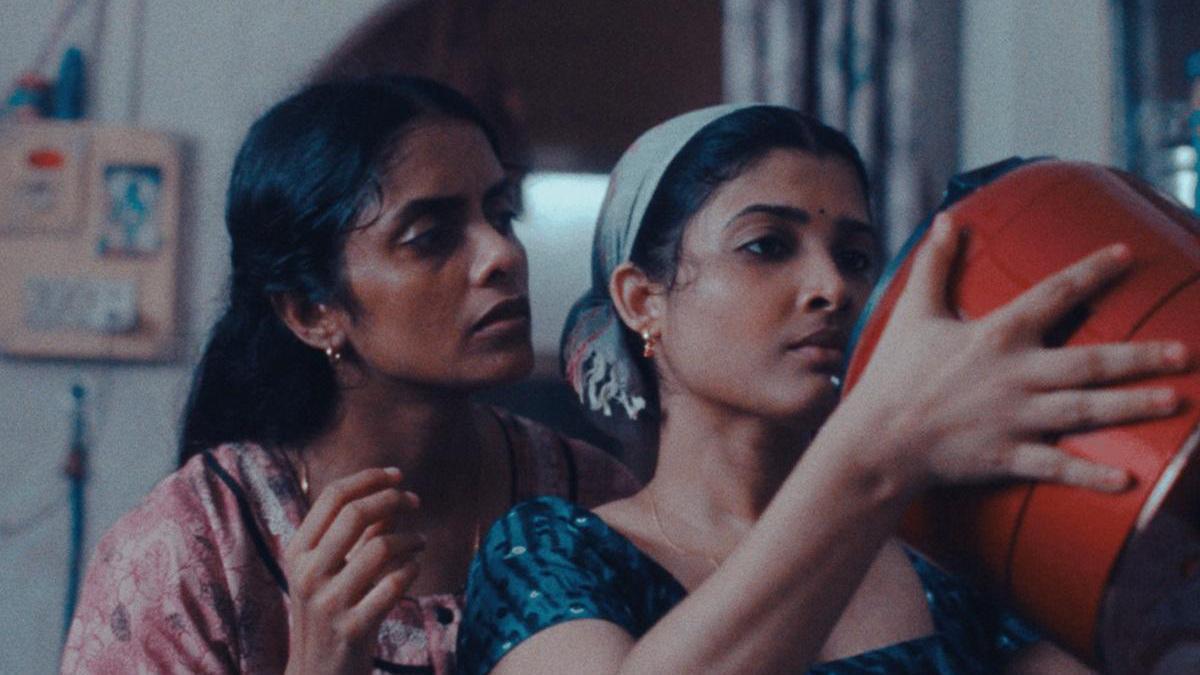
When the “spirit of Mumbai” is evoked, it typically serves to symbolize the city’s legendary resilience, especially in the face of catastrophic events. This ‘spirit’ often references the masses of anonymous citizens who venture out, unflinching, driven by necessity rather than luxury. Payal Kapadia’s debut feature, *All We Imagine as Light*, eschews such generalized notions. Instead, the film focuses on the marginalized and gives them a voice, pushing them to the center of the narrative.
The film opens with the cacophony of voices that represent these myriad lives, creating a sense of collective storytelling before honing in on three central figures. This opening sequence evokes Kapadia’s documentary filmmaking roots and allows the audience to grasp what Mumbai signifies to the thousands who migrate there for a better life. It’s within this bustling metropolis that we meet Malayali nurses Prabha (Kani Kusruti) and Anu (Divya Prabha), as well as Parvaty (Chhaya Kadam), an employee at the hospital where they work. These women embody the diverse spectrum of outsiders vying for a semblance of belonging in the city.
The heart of *All We Imagine as Light* is not in showcasing the daily grind of its characters or the nature of their work; rather, it delves deeply into their interior lives. The film illuminates their desires, disappointments, confusions, and biases with remarkable empathy. Prabha, carrying the weight of years spent in Mumbai, is plagued by the recurring distress of a husband who seemed to forget her soon after their marriage. The last communication she had with him was a year ago when he left for a job in Germany, leaving her wondering if he has anything more to say.
In stark contrast to Prabha’s weary outlook, Anu is vibrant and brimming with the thrill of newfound freedom and the exhilaration of her secret love affair with Shiaz (Hridhu Haroon). Prabha, steeped in her ingrained patriarchal values, finds Anu’s behavior troubling, often struggling to find the words to voice her discomfort. However, Anu, fully aware and resolute in her defiance, continues with her daring escapades but not without her own share of uncertainties about what her future holds.
. Meanwhile, Parvaty faces the harrowing threat of eviction from her home of over two decades. Devoid of legal documents to prove ownership, she finds herself at the mercy of voracious builders keen on skyscraper developments. Amidst such diverse adversities, these women find common threads that bind them together.
Anu and Prabha’s bond does not ignite any grand revolt, save perhaps for a whimsically rebellious scene where they lob stones at a builder’s advertisement hoarding. Their solidarity is centered more on being there for one another, offering quiet support. Halfway through the film, the nocturnal restlessness and quietude of Mumbai give way to the serene, sun-drenched calm of a seaside village in Maharashtra. Here, Kapadia gracefully blurs the lines between reality and imagination to provide Prabha with an evocative sense of closure. In these compelling final moments, the film subtly holds back, leaving the audience with a gentle sense of longing as it drifts away like a kite in the breeze.
Sometimes, the film feels like an atmospheric depiction of Mumbai, complete with gentle jazz scores accompanying various scenes. Occasionally, the perspective widens, capturing sprawling rows of flats with dim or brightly lit windows and the ceaselessly bustling suburban trains. These scenes are not exclusively about the three protagonists but serve as a testament to many other ‘outsiders’ striving to find their place in Mumbai. Kapadia effectively infuses even the most mundane moments with a lyrical quality, intentionally subverting the endlessly romanticized Mumbai rains into a frustrating impediment for a romantic encounter.
*All We Imagine as Light* serves as much a tribute to the city of Mumbai as it does to its countless outsiders who, despite their struggles, remain deeply tethered to it, unable to wholly embrace it as home but equally unwilling to sever their ties. This poignant portrayal is currently available for viewing in select theaters across Kerala.
**Published**: September 27, 2024, 04:36 pm IST
**Categories**: reviews / Indian cinema / Malayalam cinema / World cinema












